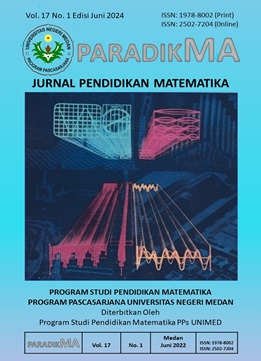Development of Learning Tools Based on the Think Pair Share Learning Model to Improve Metacognition Abilities of Junior High School 4 Panyabungan
DOI:
https://doi.org/10.24114/paradikma.v17i1.52552Abstract
This study aims to describe the validity, usability, and efficacy of learning tools based on the Think-Pair-Share learning model, the improvement of students' mathematical metacognition and mathematical communication skills through the use of the developed learning tools, and the process of students' answers to questions pertaining to mathematical metacognition and communication skills. This study is development research employing a four-dimensional development model. Validation and observation sheets, Student Books, Mathematical Metacognition Tests, and Mathematical Communication Tests are the research instruments. Trial I was conducted on students in class VIIIA, and Trial II was conducted on students in class VIIIB at SMP Negeri 4 Panyabungan. From the findings of this study, it was determined that: (1) The developed Think Pair Share learning tools including BS, LKPD, TKMM, and TKKM were included in the valid category; (2) The practicality of the Think Pair Share-based learning device that was developed revealed that: the device could be used with a few revisions and the results of observations of the implementation of the learning device in class revealed that the average practical value, the r-value, was greater than 0.5; and (3) The validity of the Think In trial II, the pre-test was 20.83 percent and the post-test was 87.50 percent; more than 80 percent of students gave positive responses to the learning tools developed; and more than 85 percent of each component of student involvement demonstrated that students were actively engaged in learning; (4) Students' mathematical metacognition and communication abilities increased using the developed Think Pair Share-based learning tool, with an N-gain score of 0.54 for mathematical metacognition and an N-gain score of 0.54 for communication ability.References
Amri, S. dan Ahmadi I. K. 2010. Konstruksi Pengembangan Pembelajaran Penagruhnya Terhadap Mekanisme dan Praktik Kurikulum. Jakarta : Prestasi Pustaka
Arends, R. 1997. Classroom Instructional Management. New York: the McGrwa-Hill Company
Arikunto, S. 2009. Dasar-Dasar Evaluasi Pendidikan Edisi 2. Jakarta: Bumi Aksara
Arikunto, S. 2013. Prosedur penelitian suatu pendekatan praktik. Jakarta: Rineka Cipta
Asmin., dan AbiIL, M. 2014. Pengukuran dan Penilaian Hasil Belajar dengan Analisis Klasik dan Modren. Medan: LARISPA
Bates. A.W. 2006. Technology, Open Learning and Distance Education. London: Rutledge
Budiningsih, C. A. 2005. Belajar dan pembelajaran. Jakarta: Rineka Cipta
Chairani, Z. 2016. Metakognisi Siswa Dalam Pemecahan Masalah Matematika. Yogyakarta: Deepublish
Desmita. 2011. Psikologi Perkembangan Peserta Didik. Bandung. PT Remaja Rosda Karya
Depdiknas. 2003. Undang-undang RI No.20 tahun 2003. Tentang sistem pendidikan nasional.
Depdiknas, 2008. Panduan Pengembangan Bahan Ajar. Jakarta: Depdiknas
Hake, R.R. 1999. Analizing Change/Gain Scores. Woodland Hills: Dept. Of Physics, India University. Tersedia [Online]: (http://www.physics.indiana.edu/~sdi/AnalyzingChange-Gain.pdf)
Herman, T. 2000. Strategi Pemecahan Masalah (Proble,-solving) dalam Pembelajaran Matematika. Makalh Disajikan dalam Kegiatan Asistensi Guru Madrasah Ibtidaiyah, Institut Teknologi Bandung Jawa Barat, 28 September s.d. 3 Oktober 2000
Nieveen, N. 2007. An Introduction to Education Design reseach. China: The east China Normal University
Permendikbud. 2014. Pengembangan Kurikulum 2013. Jakarta: Kemdikbud
Sagala, S. (2011). Konsep dan Makna Pembelajaran. Bandung: Alfabeta
Sanjaya, W. 2010. Strategi Pembelajaran Berorientasi Standart Proses Pendidikan. Jakarta: Kencana Perdana Media Group
Sinaga, B. 2007. Pengembangan Model Pembelajaran Matematika Berdasrkan Masalah Berbasis Budaya Batak (PBMB3). Disertasi. Tidak dipublikasikan. Surabya: PPs. Unesa
Slameto. (2010). Belajar dan Faktor-faktor Yang Mempengaruhinya. Jakartta: Rineka Cipta
Slavin, R. E. 2006. Educational Pshycologi, Theories and Practice. Eighth edition. Masschusetts : Allyn and Bacon Publishers
Solso, R. L. 2007. Psikologi Kognitif. Jakarta : Penerbit Erlangga. Edisi ke- Delapan
Sudjana. (2005). Metoda Statistika. Bandung : Tarsito
Yamin, M. (2013). Pendekatan & Metode dalam Model Pembelajaran. Jakarta: Referensi (Gaung Persada Press Group)
Yanty Putri Nasution, E., Emjasmin, A., Rusliah, N., Agama Islam Negeri Kerinci, I., Kapten Muradi Sungai Penuh, jalan, & Penuh, S. (2021). Analisis Metakognitif Siswa Dalam Menyelesaikan Masalah Integral. Jurnal Ilmiah Pendidikan Matematika ALQALASADI, 5(2), 141“150.
Zuhdan, K., & Tim. (2011). Pengembangan Perangkat Pembelajaran Sains Terpadu untuk Meningkatkan Kognitif, Keterampilan Proses, Kreativitas serta Menerapkan Konsep Ilmiah Peserta Didik SMP. Yogyakarta: UNY


